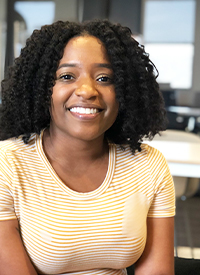
Tashi Copeland
by Tashi Copeland, Communications Manager at CICF
2020 has been a challenging year for the city of Indianapolis. For Central Indiana. For this country. Not only are residents coping with the COVID-19 pandemic, but the epidemic of violence has continued to plague the Circle City. Many organizations are designing programs to remedy the situation. One of those organizations looking to cure the city of violence is Community Action of Greater Indianapolis (CAGI) with its project: We CANN M.O.V.E. (Mobilize Our Voice for Engagement).
A Data-Based Approach with Front Line Workers
The project was recently awarded $150,000 from the Violent Crime Prevention Grants Program. The Violent Crime Prevention Grants Program works in alignment with the city’s Community-Based Violence Prevention Partnership Grant program to support evidence-based violence reduction programming and wraparound services. The grant program had four main focus areas this year: violence reduction, intervention, prevention, and neighborhood-based strategies. We CANN M.O.V.E. focuses on neighborhood- strategies. Kicking off earlier this year in September, the project is under the larger umbrella of CAGI’s Community Action Neighborhood Network (CANN) program, which takes an evidence-based approach to decreasing crime and health disparities. We CANN M.O.V.E. utilizes trauma-informed, community-building approaches to reduce the violence that has impacted the lives of individuals, families, and the community.
“Often times, a trauma response is the inability to dream.”
Currently, the program has a site campus at the Rise Star Shadeland Apartment complex at 3900 Shadeland Avenue, with 65 families of the complex currently enrolled in the program. Being directly on-site allows the program to be hands-on with the members, establish resident ambassadors, and have the means to engage the community at large. The program is looking to expand its reach to other families in the surrounding area.
Focusing on People with Pre-Existing Conditions
At the root of violence are pre-existing social conditions such as systemic racism, disinvestment, and poverty that affect residents of underappreciated neighborhoods in disproportionate numbers. We CANN M.O.V.E. focuses on serving communities through a strategic approach that suppresses factors such as unemployment/underemployment, lack of education and job skills, and barriers to relief.
“We know that often times people want to transform their communities, but they lack the resources and social capital to do so,” said Val Tate, Community Engagement and Development Director at CAGI. “This is an opportunity to assist them with that.
Resident ambassadors are helping lead the charge. The initial ambassadors were referred by the residential office manager. The manager suggested residents that indicate a constant concern for wanting the best for their communities. Future ambassadors will be recruited by the current ones. Coupling leadership training with lived experiences, resident ambassadors are positioned to not only see change in their communities but also have a direct hand in developing innovative approaches that reach their neighbors and effectively meet their needs.
Providing the Necessary PPE
Organizations will often take a one-size-fits-all model to development. A consequence of this approach is individuals don’t perceive personal relevance, and they don’t feel like their needs are met. They become reluctant to engage in future development sessions and likely won’t believe in their likelihood of success.
We CAN M.O.V.E. does not support the one-size-fits-all approach. Instead, it offers a customized approach that prepares each individual and family for wrap-around services that address their specific living situations. Through the CAGI development workshop, “SWAG Out My Goals”, neighbors establish short- and long-term goals, in addition to relationship-building and networking skills.
“Often times, a trauma response is the inability to dream,” said Tate. “This workshop gives members a baseline for understanding goals. It is a mutually beneficial session. The members create a strategy to achieve their dreams and with coaching, learn how to be more impactful.”
The program deploys four protective factors to engage participants in changing attitudes and behaviors. These protective factors come in the form of the following individuals:
- Mobile Recovery Coach – completes a Community Asset Based door-to-door survey and enrolls families. The Coach has similar lived experiences to the participant.
- Mobile Care Coordinator – completes a psychosocial assessment and support neighbors with crisis intervention if needed. Interventions consist of support with utilities, housing, food, education, medical, and mental health needs.
- Mobile Job Coach – supports with job placement and training. This includes resume writing, interview skills, emotional intelligence, connecting to good and promising employers, certifications and post-secondary education.
- Mobile Street Outreach Coach – engages customers to prevent interaction with the criminal justice system and gun violence.
Flattening the Curve
2020 is the most violent year recorded in Indianapolis history. We CANN M.O.V.E. is committed to flattening that curve. At the culmination of the first year, the program has goals for its members to be above the poverty line, have a feeling of safety in their community resulting in lower number of violent crimes and creating an overall shift of mindset.
“We are really working alongside the community rather than bringing a temporary relief system,” said Clare Pope, Community Builder and Manager of We CANN M.O.V.E. at CAGI. “We’re here to help residents become self-sufficient and self-reliant.”
And that’s the ultimate goal—developing both mind and body to defend themselves against trauma. Building up systems to work together to create stability and balance. Creating a network to stimulate new growth. Just like the human body, the city has the capacity to heal itself from the epidemic of violence, only if we address the underlying issues. And We CANN M.O.V.E. is committed to be a significant catalyst—among many others—to aide in that healing process for our community.






Leave A Comment